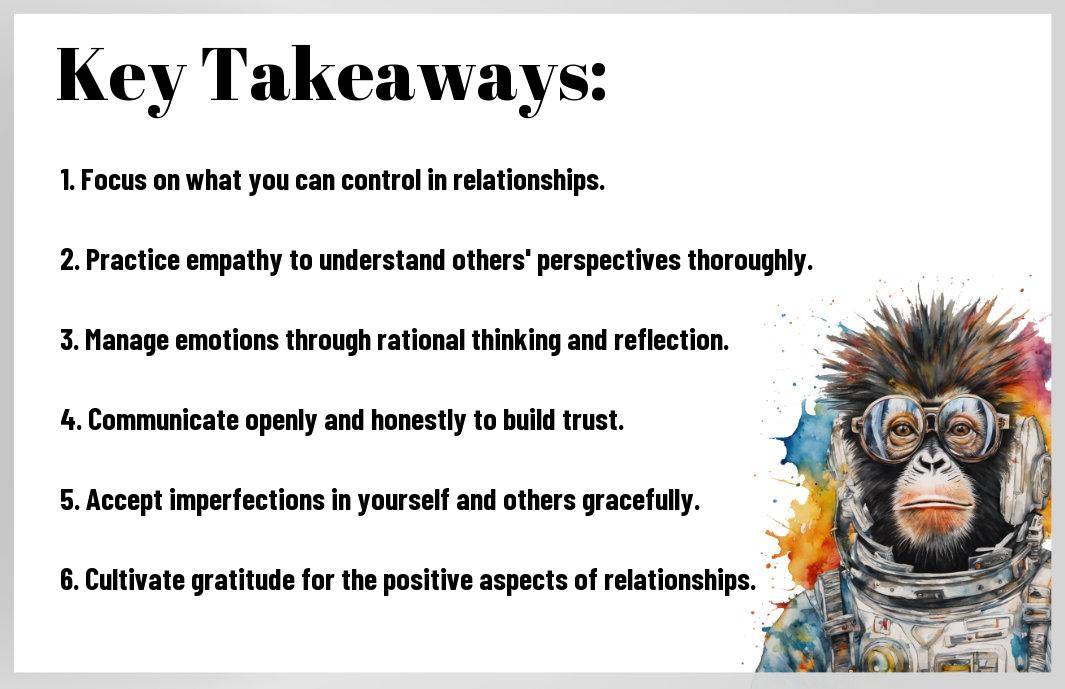Many of us navigate the ups and downs of relationships, often feeling overwhelmed by emotions and misunderstandings. I’ve found that applying Stoic principles can offer a refreshing approach to building and maintaining healthier connections with others. By focusing on what I can control and letting go of what I can’t, I can communicate more effectively, manage conflicts with grace, and cultivate deeper empathy. In this post, I’ll share how Stoicism can transform your interactions and lead to more fulfilling relationships.
Key Takeaways:
- Emotional Control: Stoicism teaches the importance of managing your emotions, which can lead to healthier interactions with others.
- Empathy: Practicing Stoicism encourages understanding others’ perspectives, fostering deeper connections in relationships.
- Virtue Focus: Building relationships based on shared values and ethical behavior promotes trust and respect.
- Acceptance: Embracing the inevitability of challenges in relationships can reduce frustration and enhance resilience.
- Effective Communication: Stoicism highlights the significance of clear and honest communication, leading to fewer misunderstandings.
- Mindfulness: Staying present in conversations helps maintain meaningful interactions and strengthens bonds.
- Letting Go: Learning to detach from outcomes can lead to reduced anxiety in relationships, allowing for greater appreciation of the moment.

Understanding Stoicism
Before delving into the intricacies of using Stoicism for better relationships, it’s imperative to grasp what Stoicism is all about. Rooted in ancient philosophy, Stoicism teaches us how to navigate life’s challenges with grace and resilience. This approach emphasizes the importance of focusing on what we can control while accepting what we cannot. By embodying these principles, we can cultivate a more peaceful and balanced mindset in our daily interactions with others.
The Core Principles of Stoicism
Beside providing a framework for personal growth, the core principles of Stoicism invite us to practice mindfulness and emotional intelligence in our relationships. At the heart of this philosophy are four main virtues: wisdom, courage, justice, and temperance. These virtues serve as guiding lights, encouraging us to make thoughtful decisions and treat others with fairness and respect. This conscious approach can profoundly affect how we engage with our friends, family, and partners, urging us to act from a place of understanding rather than reaction.
How Stoicism Relates to Relationships
About weaving Stoicism into the fabric of our relationships opens up a world of opportunities for deeper connections. When I apply the principles of Stoicism, I find that I can navigate disagreements with a clearer mind and steadier heart. For instance, instead of reacting impulsively during conflicts, I strive to pause, consider the other person’s perspective, and respond thoughtfully. This not only diffuses tensions but also enhances mutual respect and understanding.
Considering how Stoicism can transform our relationships inspires me to reflect on my emotional responses and offers valuable insights into fostering harmony. By embracing the idea that I can control my reactions while letting go of the need to control others, I am creating space for more authentic interactions. When I approach situations with a Stoic mindset, I prioritize emotional clarity and openness, leading to a profound shift in how I relate to those around me. This perspective not only strengthens my connections but also nurtures an environment where love and empathy can thrive.

Cultivating Emotional Resilience
Clearly, cultivating emotional resilience is an imperative aspect of building stronger relationships. Embracing the principles of Stoicism allows us to better handle the ups and downs that naturally come with interpersonal connections. By practicing emotional resilience, I can maintain a sense of calm even when faced with challenges, misunderstandings, or conflict. This emotional steadiness helps me respond thoughtfully rather than react impulsively, paving the way for healthier interactions with others.
Managing Emotions with Stoicism
After discovering Stoicism, I’ve learned the importance of recognizing my emotions without letting them dictate my actions. Instead of suppressing or denying feelings, I’ve found value in acknowledging them as a natural part of my experience. By applying Stoic techniques, such as reframing challenging thoughts and focusing on what I can control, I’m able to manage my emotional responses effectively. This has provided me with the tools to navigate tough conversations and conflicts without getting swept away by my feelings.
Building Stronger Connections
Managing relationships also requires a conscious effort to build deeper and more meaningful connections with others. Stoicism teaches me to approach interactions with empathy and understanding, recognizing that everyone has their own struggles and perspectives. By being more present in my conversations and listening actively, I cultivate an environment where open dialogue can flourish. This strengthens the bonds I share with my loved ones, fostering a sense of trust and harmony.
In addition, I find that a foundation of emotional resilience allows me to handle conflicts more constructively. When disagreements arise, I strive to remain calm and focused on finding common ground rather than letting frustration take over. By practicing Stoic principles, I can engage in discussions with a mindset of collaboration. This promotes connection and enhances the quality of my relationships, showing me that enduring bonds are built through patience, understanding, and mutual respect.

Practicing Empathy and Understanding
Your relationships can significantly improve when you embrace empathy and understanding. By genuinely seeking to connect with others’ experiences, you cultivate a deeper bond that goes beyond mere surface-level interactions. Stoicism teaches us that we are not alone in our struggles; everyone faces their own challenges, and acknowledging this helps us navigate our relationships with greater patience and kindness. As we bring empathy into our daily lives, we create a nurturing environment that allows all parties to express themselves more openly and honestly.
Seeing Through Others’ Perspectives
Behind every action, there’s a story waiting to be understood. When you take a moment to step into someone else’s shoes, you often find that their behavior is influenced by factors unknown to you. Understanding their viewpoint doesn’t mean you have to agree with them; rather, you open the door to compassion and connection. By seeing through others’ perspectives, our default reactions shift from judgment to curiosity, inviting richer conversations and fostering connections that withstand the test of conflict.
The Role of Compassion in Stoicism
Beside empathy, compassion plays a fundamental role in the Stoic philosophy of nurturing relationships. Stoicism encourages us to maintain a sense of unity as human beings, recognizing that we all face trials and tribulations. When we approach others with compassion, we create a warm space where vulnerability is welcomed. This not only strengthens our connections but also lays the groundwork for mutual support during tough times.
Due to the inherent nature of human relationships, practicing compassion can unlock emotional resilience. It allows you to bounce back from misunderstandings with grace and an open heart. When I choose to lead with compassion, I find that conflicts become opportunities for growth rather than obstacles to connection. This mindset helps me embrace the complexities of relationships and fosters an environment where others feel valued and supported.
Setting Healthy Boundaries
Now, let’s talk about the importance of setting healthy boundaries in our relationships. I’ve come to realize that boundaries are not just walls that keep others out; rather, they’re guidelines that help me establish a space where I can feel safe and respected. When I set boundaries, I communicate my needs and values to others, which creates a foundation of respect and understanding. This clarity fosters healthier interactions, allowing me to be my authentic self without the fear of being taken advantage of or misunderstood.
The Importance of Boundaries
Below is my experience with boundaries—they truly empower me to navigate my relationships with confidence. By clearly defining what is acceptable and what isn’t, I can avoid unnecessary conflicts and emotional drain. Exploring my limits has helped me prioritize my well-being while still allowing myself to connect deeply with others. Those around me can also better comprehend how to interact with me, creating a harmonious environment in which everyone feels valued.
Navigating Relationships with Clarity
Clarity in my relationships allows me to engage with others meaningfully without feeling overwhelmed or anxious about the dynamics at play. I find that when I articulate my boundaries clearly, I help set expectations that everyone can understand and respect. This proactive approach not only enhances my connections but also makes me feel more empowered in the situations that arise.
Hence, applying Stoic principles reinforces this clarity as I strive to focus on what I can control—the way I communicate and uphold my boundaries. I’ve learned that it’s okay to say no without guilt or to express my feelings openly. This practice transforms my relationships into spaces of mutual respect and understanding, where everyone knows where they stand and can flourish together without stepping on each other’s toes.
Communicating Effectively
Keep in mind that effective communication is foundational for building and maintaining strong relationships. In my experience, the way I convey my thoughts and feelings can either strengthen my bonds with others or create additional friction. A hallmark of Stoicism is the practice of clarity, not just in thoughts but in words. By focusing on the essence of what I want to communicate and expressing it in a calm manner, I can enhance understanding and minimize misunderstandings. It’s all about being mindful of my language, tone, and the emotions that underpin my messages.
The Art of Stoic Communication
Along the journey of applying Stoicism to my life, I’ve come to appreciate the art of communication much more deeply. One key aspect is to strive for authenticity while remaining composed. When I communicate in a straightforward and respectful manner, I invite openness and trust. This not only helps me articulate my thoughts but also encourages others to express themselves without fear of judgment. By clarifying my intentions, I create a space where meaningful dialogues can flourish, leading to stronger connections.
Overcoming Conflicts Gracefully
For every relationship, conflicts are inevitable. However, how we handle those conflicts makes all the difference. When I find myself in a disagreement, I try to embrace the Stoic principle of empathy while seeking to understand the other person’s perspective. This approach allows me to remain calm and reasoned, instead of reacting impulsively out of anger or frustration. By acknowledging the validity of the other person’s feelings, I can address the issue at hand without letting emotions spiral out of control. It’s imperative to approach conflict with the intention of reaching a resolution that respects both parties involved.
The beauty of overcoming conflicts gracefully lies in the growth that follows. Each resolution not only strengthens my relationships but also enhances my personal development. By applying a Stoic mindset, I learn to view conflicts as opportunities rather than obstacles, fostering an environment where I can express myself honestly while valuing the perspectives of others. This balance creates a more harmonious space for communication to thrive, allowing our relationships to grow and evolve positively.
The Journey of Personal Growth
Not every aspect of personal growth is easy, but it can lead to more fulfilling relationships. As I walk down this path, I’ve discovered that personal growth is not just about improving myself, but also about enhancing the connections I have with those around me. Each step forward feels like a ripple effect, not only influencing my life but also the lives of the people I cherish. This journey has illuminated the importance of being more mindful, patient, and understanding in my interactions.
How Stoicism Encourages Self-Reflection
By embracing Stoicism, I’ve learned the importance of self-reflection, especially in times of conflict or misunderstanding. This philosophical approach encourages me to take a step back and evaluate my feelings and reactions. Instead of rushing to blame others or external circumstances, I find myself asking, “What part of this situation can I control?” This not only fosters a deeper understanding of my own emotions but also opens the door for healthier conversations with those I care about.
Fostering Mutual Growth in Relationships
After prioritizing self-reflection, it becomes evident just how much our personal growth can benefit our relationships. As I gain insights into my own behaviors and motivations, I’m better equipped to support my friends and loved ones in their journeys as well. Stoicism encourages vulnerability and open communication, making it easier for me to express both my struggles and triumphs. This shared growth creates a bond that often deepens trust and understanding.
Consequently, when both individuals in a relationship commit to personal growth, it cultivates an environment that nurtures both parties. I find that as I work on myself, my loved ones feel empowered to do the same. We inspire one another to tackle challenges and celebrate victories together—whether they’re big or small. This mutual dedication transforms relationships into a collaborative journey, where we not only support each other but thrive together. Personal growth enriches my connections, allowing them to blossom in ways I once thought were unimaginable.
Final Words
Summing up, I’ve come to realize how embracing Stoicism can profoundly enhance my relationships. By focusing on the aspects of human connection that I can control—my reactions, my patience, and my understanding—I find that I can navigate conflicts with a clearer mind. Encouraging a perspective shift allows me to appreciate my loved ones more deeply, recognizing that we are all on this journey together. I highly recommend exploring resources like The Stoic Heart – Stoicism and Partnered Relationships for deeper insights. The tools and principles described there can truly empower us to cultivate a healthier, more supportive environment in our relationships.
In the end, as we practice Stoic principles, we’re not only improving ourselves but also enriching our bonds with others. I encourage you to take small steps towards adopting a Stoic mindset in your interactions. By fostering gratitude, empathy, and self-control, we can transform our relationships into something genuinely fulfilling. So, let’s indulge in this wonderful journey of growth together, supporting each other through the ups and downs while keeping a Stoic frame of mind.
FAQ
Q: What is Stoicism and how can it improve my relationships?
A: Stoicism is an ancient philosophy that emphasizes rational thought, self-control, and virtue as a means to achieve a good life. By applying Stoic principles to your relationships, you can enhance emotional resilience, improve communication, and foster a deeper understanding of others. It encourages practicing empathy and recognizing the importance of perspective, which can lead to healthier, more fulfilling connections.
Q: How can I practice emotional resilience in my relationships using Stoicism?
A: Emotional resilience in relationships can be cultivated by focusing on what is within your control and letting go of what isn’t. Stoicism teaches the value of maintaining a calm mindset, regardless of external circumstances. By acknowledging that you can’t control others’ actions or feelings, you can reduce the emotional turmoil that often arises from misunderstandings and conflicts, allowing for more constructive interactions.
Q: What role does empathy play in Stoicism and relationships?
A: Empathy is an vital element of Stoicism, as it encourages understanding and acceptance of others’ perspectives. By practicing empathy, you can better connect with loved ones, fostering an environment of trust and respect. Stoicism invites you to see the shared human experience and recognize that everyone has their challenges, which helps to navigate relationship difficulties with compassion and patience.
Q: How can I communicate more effectively in my relationships through Stoic principles?
A: Effective communication is enhanced by applying Stoic principles such as clarity, patience, and consideration. By focusing on expressing your thoughts and feelings clearly and calmly, you reduce the chances of miscommunication. Additionally, practicing active listening and taking time to reflect before responding can lead to more constructive dialogues, helping both parties feel heard and valued.
Q: Can Stoicism help in dealing with conflict in relationships?
A: Yes, Stoicism offers valuable tools for managing conflict. It encourages individuals to approach disagreements with a mindset of understanding rather than blame. By practicing self-control and focusing on the rational aspects of the disagreement, you can work towards finding solutions rather than escalating tensions. This approach promotes healthier conflict resolution, leading to stronger relational bonds.
Q: How can I maintain Stoic composure during emotional ups and downs in my relationships?
A: Maintaining composure in the face of emotional challenges involves practicing mindfulness and self-reflection. Stoicism teaches the importance of observing your emotions without being overwhelmed by them. Techniques such as journaling your thoughts, meditating, or simply taking a step back to evaluate a situation can help you stay grounded during turbulent times, allowing for more balanced responses.
Q: Is it possible to share Stoic values with my partner and strengthen our relationship?
A: Absolutely! Sharing Stoic values with your partner can create a strong foundation for your relationship. Engaging in discussions about Stoic principles, like the importance of virtue, understanding, and emotional regulation, can foster mutual growth. Consider exploring Stoic texts together or attending workshops on the subject, which can provide common ground for deeper connection and understanding in your relationship.



